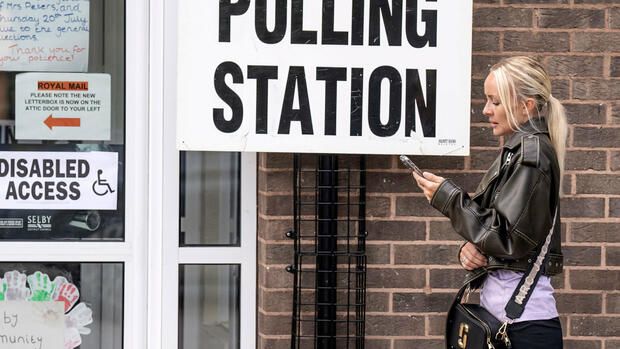Voting in the county of North Yorkshire: The by-elections were comparatively bad for the governing Conservatives.
(Photo: AP)
London Prime Minister Rishi Sunak’s ruling Conservatives have suffered a major defeat in the UK by-election. The Tories lost their stronghold at Somerton in the south-west to the Liberal Democrats and the seat of Parliament at Selby in north-east England.
The surprise of election night was that Sunak’s party retained ex-Prime Minister Boris Johnson’s former constituency in Uxbridge, near London, despite only having a slim majority there.
Strathclyde University election researcher John Curtice said: “The results of the by-election show that the Conservatives remain in deep trouble. This roughly corresponds to the trend in opinion polls.”
According to the latest polls, the opposition Labor Party even has a 20 percentage point lead over the Tories, who have been in power for 13 years. The next parliamentary elections will probably take place next year.
The reason for the dissatisfaction of many voters with the conservative government is the long-standing misery in the state health system and other public services as well as the sharp increase in the cost of living. With an inflation rate of 7.9 percent most recently, the UK still has the strongest inflation of all seven major industrial nations (G7). In addition, there are numerous scandals in the Conservative Party, which have cost the Tories a lot of sympathy among voters.
No march to victory for Labor
The by-elections had become necessary because three conservative members of the lower house had resigned their mandates. Among them is Johnson, who resigned after a parliamentary committee accused him of lying to the House of Commons about government breaches of corona rules during the pandemic.
By-elections: British Conservatives lose in two constituencies
The most important achievement for Labor is victory in rural Selby, Yorkshire, where the party converted a Tories lead of more than 20,000 votes into a victory by 4,000 votes. “We have rewritten the rules for possible Labor gains,” said newly elected MP Keir Mather, just 25. Opposition leader Keir Starmer spoke of a “historic victory” for his party. The voters had shown how strong their desire for a change of government was.
Greg Hands, general secretary of the Conservative Party, attributed the defeat in the Northeast primarily to the fact that many regular voters stayed at home. Equally negative for the Tories, however, is that they are also coming under pressure in the conservative south-west of England.
The Liberal Democrats won comfortably in the Somerton and Frome constituency by more than 10,000 votes. Election researcher Curtice said the result shows that the Liberal Democrats are not only capable of beating the Conservatives, but also of ousting Labor.
>> Read here: Parliamentary committee delivers scathing verdict Boris Johnson
The fact that the Tories were able to hold on to the constituency in Uxbridge, west London, which Johnson vacated, bucking the national trend is further evidence that Labor is far from on the march to victory next year. The Tories held their ground in Uxbridge by almost 500 votes.
hopes not fulfilled
The controversial transport policy of London Mayor Sadiq Khan became a problem for the largest opposition party. The Labor politician had recently extended the metropolis’ low-emission toll zone (ULEZ), angering many commuters in Uxbridge.
Labour’s Vice-President Angela Rayner acknowledged that her party “still has a lot to do” to ensure that environmental protection does not fuel the sharp increase in the cost of living. “The result in Uxbridge shows that people want to do the right thing, but they don’t want to be penalized because they can’t afford to convert their vehicles.” Her party colleague Steve Reed has already called for a change of course in environmental policy.
In Curtice’s opinion, the opposition party needs to ask itself why the positive national trend is too weak for Labor to sideline local problems like the ULEZ.
In the opinion of the election researcher, however, the most important message of the by-elections goes to the conservative prime minister: “So far, the replacement of Liz Truss by Rishi Sunak has not brought about what the conservatives had hoped for.”
>> Read here: Great Britain wants to become a technological superpower
The Tories would be cornered by Labor and Liberal Democrats. Their constituents voted tactically and would vote for the candidate most likely to beat their conservative rival.
More: How the government and opposition in London are struggling with their goals.
